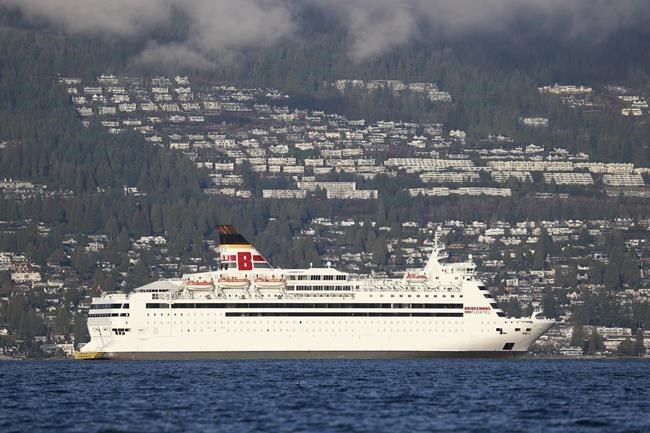SQUAMISH, –°¿∂ ”∆µ — Plans to use a renovated cruise ship to house more than 600 workers at a liquefied natural gas facility near Squamish, –°¿∂ ”∆µ, have been voted down by the local council.
The ship arrived in –°¿∂ ”∆µ waters in January after a 40-day journey from Estonia, where it had sheltered Ukrainian refugees, but the District of Squamish had yet to approve the Woodfibre LNG Ltd. plan to operate the so-called "floatel."
Squamish councillors voted three to four against a one-year permit at a meeting on Tuesday, where those opposed to the plan raised concerns about the safety of women and girls, traffic issues, waste management and potential natural hazards.
Coun. Lauren Greenlaw told the meeting that she has experienced sexual violence first-hand throughout her career working in the resource industry, and she is troubled about a lack of information and measures to protect the community.
"My biggest concern is (that) we as a municipality do not have sufficient safeguards in place to protect us from negative social impacts, and we can't really fully understand the cumulative impacts ... with the information that we have," she said.
Mayor Armand Hurford said the province's environmental assessment certificate for the project was amended last year to add a section related to gender-based violence, including a requirement for a gender and cultural safety plan.
The plan is not currently available to the public, he said.
The mayor proposed a motion to approve a one-year temporary use permit with the possibility of one three-year renewal, rather than an initial term of three years.
Hurford said the floatel's performance over the first year would provide clarity for the renewal discussion, but the motion was rejected.
The meeting heard that the mayor or any of the four councillors who voted with the majority could bring the motion back for reconsideration within 30 days.
Coun. John French voted in favour of granting the permit for the floating work camp, saying the Woodfibre facility has approvals from the –°¿∂ ”∆µ and federal governments, as well as the Squamish Nation, and construction is underway.
"Denying this permit is not going to stop the project," he said, adding the floatel is "basically what the community asked for" when it came to housing workers.
"Many people in Squamish made it clear, they fear the out-of-town workers. They also made it clear, there's comfort in knowing the bulk of the workforce won't have access to recreation, entertainment and leisure opportunities in Squamish."
The vote took place a week after the district held a public meeting about the floatel plan.
Greenlaw said she had tallied the feedback and found 92 per cent of submissions opposed the approval of the floatel. Among the people who spoke in favour of the project, she said about half "were directly financially benefiting from this project."
Several councillors with the district noted in Tuesday's meeting that the LNG project was not at issue, rather the decision was whether to allow the floating work camp.
Woodfibre LNG had been planning for workers to start living on the ship this spring on the shores of Howe Sound, outside Squamish.
In a statement last fall, Woodfibre president Christine Kennedy said it has always been a priority to ensure construction "has as little impact on Squamish as possible."
Tracey Saxby, executive director of the advocacy group My Sea to Sky, issued a statement saying Woodfibre knowingly chose to take the risk of bringing the vessel into –°¿∂ ”∆µ waters without approval from the district to anchor it at the site.
"Community members, who are on the front line of this LNG export project, raised concerns about human rights impacts for women and girls, worker safety and well-being, traffic safety, and waste disposal," she says in the statement.
There are "so many unknowns," she says, and the company's application is missing key information the community needs to make an informed decision.
— By Brenna Owen in Vancouver
This report by The Canadian Press was first published May 1, 2024.
The Canadian Press




